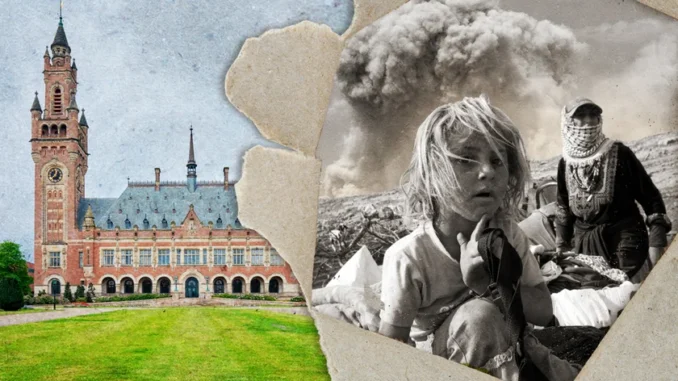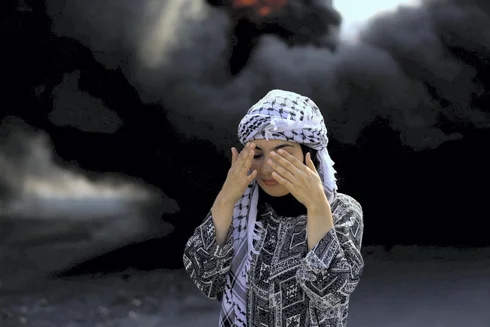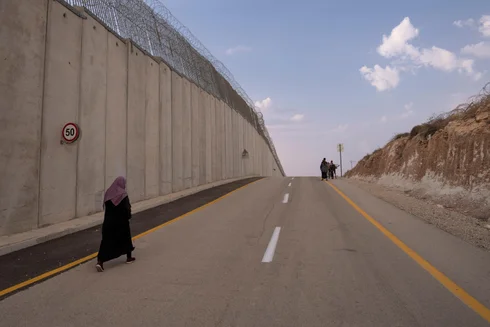T. Belman. Any opinion given by the IJC will take years and will not be binding, yet it will fuel our defamers. Neither UNSC Res 242 nor the Oslo Accords, designated these lands as “Palestinian lands” nor did they promise a Palestinian state. The UN and Haaretz simply assumes that the Palestinians have a right to have their state on these lands. The Security Council by this resolution authorized Israel to remain in occupation until she had “secure and recognized boundaries”, so the occupation is not “illegal” as claimed.
After a UN panel voted to ask the ICJ to opine on Israel’s 55-year occupation of Palestinian territories, two legal scholars explain the ramifications of such a move and how Israel can respond
The International Court of Justice in the Hague. Credit: Mohammed Ballas / AP; Ingimage; Artwork by Anastasia Shub
A United Nations panel voted last week to request an opinion from the International Court of Justice on the legal consequences of Israel’s “prolonged occupation, settlement and annexation of Palestinian territory” since 1967.
Palestinian President Mahmoud Abbas has long warned that Israeli intransigence to revive the moribund peace process would prompt him to seek redress via international channels, and the UN’s Special Political and Decolonization Committee is his latest battleground of choice.
The Palestinians unreservedly welcomed the step, with Foreign Minister Riyad al-Maliki expressing hope that the resolution would “open a new era for holding Israel accountable for its war crimes.”
Israel’s outgoing Prime Minister Yair Lapid slammed the motion, which he said “will not change the reality on the ground, nor will it help the Palestinian people in any way; it may even result in an escalation. Supporting this move is a prize for the terrorist organizations and the campaign against Israel.”
Between a wishful diplomatic upheaval on one side and a sense of persecution on the other, what could such a legal opinion mean for Israel and the Palestinians? Haaretz spoke to two legal scholars to understand the implications of the move.
A Palestinian demonstrator reacting as smoke rises from a burning tire during a protest demanding Israel to reopen closed roads leading to Nablus, earlier this month.Credit: MOHAMAD TOROKMAN/REUTERS
What is the ICJ’s mandate?
The International Court of Justice in The Hague has two main functions: adjudicating disputes between two states; and providing advisory opinions to UN bodies.
The UN vote relates to the ICJ’s counsel, but the ability to enforce such a legal opinion is limited. “It is an ‘advisory’ function and even the UN General Assembly is not bound by it,” explains Prof. Yaël Ronen, professor of law at the Academic Center for Science and Law in the central Israeli city of Hod Hasharon.
- Thanks to Putin, the world is suddenly interested in Israel’s occupation
- New government’s agenda puts Israel on collision course with the ICJ
- Israel’s chutzpah at the United Nations
- Israeli officials: ICJ probe almost certain
“However, an opinion by the ICJ constitutes an authoritative interpretation of international law, and states wishing to abide by that law cannot disregard the content of such an opinion for the sole reason that it is not binding,” she says. ( NOT ONLY IS IT NOT BINDING, IT IS NOT LAW. IT IS MERELY AN OPINION)
An advisory opinion is likely to feed back into the rest of the UN bodies, though, and increase pressure for political action against Israel.
What is the timeline?
The draft resolution was passed by the UN’s Special Political and Decolonization Committee last Friday and will go to the General Assembly for a final vote next month.
Given the clear majority after the committee voted 98-17 in favor the move last week, the request for an advisory opinion appears to be a foregone conclusion – though certain clauses about Jerusalem could be contested by the time of the final vote.
The ICJ will then be mandated to launch an investigation, but the process could be dragged out for months or even a few years.
What are Israel’s options when dealing with such a probe?
According to Prof. Yuval Shany, the Hersch Lauterpacht Chair in Public International Law at the Hebrew University, it is not a question of whether or not Israel cooperates. “They will either ignore the whole thing or argue only on jurisdictional issues,” meaning whether the court has the authority to rule on the territories.
On the one hand, Israel’s unwillingness to cooperate may strengthen the court’s conclusions against Israel. On the other, it will serve any attempts to delegitimize the investigation.
The ICJ issued its first and only advisory opinion related to Israel in 2004, over the construction of the West Bank separation barrier, and this serves as the best indicator for its potential response this time.
While that advisory opinion found that the wall was “tantamount to annexation and illegal,” Israel’s legal counsel countered by arguing that the decision was based on partial and outdated data – because Israel did not cooperate nor provide data to the fact-finding team.
Following the rulings of its own Supreme Court, Israel unilaterally changed the route of the barrier as the international hearings were unfolding, killing any implementations.
Given the span and sensitivity of the advisory opinion this time around, though, Israel is unlikely to undercut the investigation by preemptive action.
What would a new probe focus on?
The draft resolution comes on the heels of a report by the UN’s Human Rights Council last month, which found that Israel’s occupation is “unlawful under international law.”
“There was already broad consensus internationally about the illegality of the settlements,” Shany notes, but last month’s report is likely to affirm what was a “radical position 20 years ago”: that Israel’s occupation of Palestinian territories is itself illegal.
Shany points to the “open-ended nature” of the occupation, as well as “demographic engineering” and “policies of de-facto annexation,” in precipitating this shift.
The ICJ 2004 advisory opinion on Israel’s construction of the West Bank separation barrier “had used more tentative language regarding annexation, but it could go further this time around,” Ronen says.
Palestinian farmers walking next to the West Bank separation barrier last month.Credit: Oded Balilty/AP
Beyond this, the report broadened the scope to investigate the “root causes of recurrent tensions,” and extended the probe to include “systematic discrimination and repression based on national, ethnic, racial or religious identity.”
Last Friday’s UN motion follows in step, mentioning “discriminatory legislation and measures,” which Ronen believes feeds into the question of whether Israel is committing the crime of apartheid.
While the charge is not explicitly mentioned, the reference to discrimination “could strengthen the [separate] International Criminal Court in investigating crimes of apartheid” down the line.
“The language is a precursor to claims of systemic discrimination and even apartheid,” Shany concurs, and also points to the renewed focus on Jerusalem as well as the West Bank.
What are the possible ramifications?
Unlike the International Criminal Court, the ICJ does not have the power to prosecute individuals but primarily works between states.
Any advisory opinion won’t hang arrest warrants over the heads of Israeli generals anytime soon, but it could lend momentum to campaigns to exert political pressure on Israel.
“It’s not the court’s institutional power that matters but its authority as an interpreter of the law,” Ronen says. “Nobody is required to act on it. However, the court is stating what international law demands and prohibits.”
While the court may not go as far as recommending political measures, it would defer the next steps back to UN bodies, and “its findings could be relevant for the ICC afterward,” she says.
While the staunchest supporters and detractors are likely to remain unmoved, an advisory opinion is likely “to reinforce the expectations from third states,” Ronen explains, “and this invites stronger pressure on Israel regarding its policies in the West Bank” – in particular, on countries that espouse democratic values.
Shany says the ruling “will afford an authoritative legal position by the UN’s principal judicial body for critics of Israel.”
A warning from history
In 2019, the ICJ issued an advisory opinion that the United Kingdom is obliged to end its administrative control over the Chagos Islands “as rapidly as possible,” and that all member states “must cooperate with the United Nations to complete the decolonization of Mauritius.” The General Assembly affirmed this in a resolution in 2021.
Although the British government rejected the court’s jurisdiction, it did agree earlier this month to enter negotiations with Mauritius over the sovereignty of the Chagos Islands.
Shany explains that Mauritius “embarrassed Britain, and managed to create multilateral momentum in its favor,” and that the Palestinians are no different: “This is an attempt by the Palestinians to delegitimize Israel’s activities in the West Bank and jump-start a political process.
“So far,” he continues, “these legal campaigns have not had a decisive effect on the situation on the ground – either because the stakes are so high, or because of the vast power asymmetry, or because the Palestinian cause alone doesn’t determine countries’ relations with Israel.
“It won’t be a silver bullet,” Shany says. “The main game is politics, and law is just one form of leverage that could be used.”
Jonathan Lis contributed to this report.
<
>
<
>






I thought the US got the P.A. to agree not to pursue the matter further.